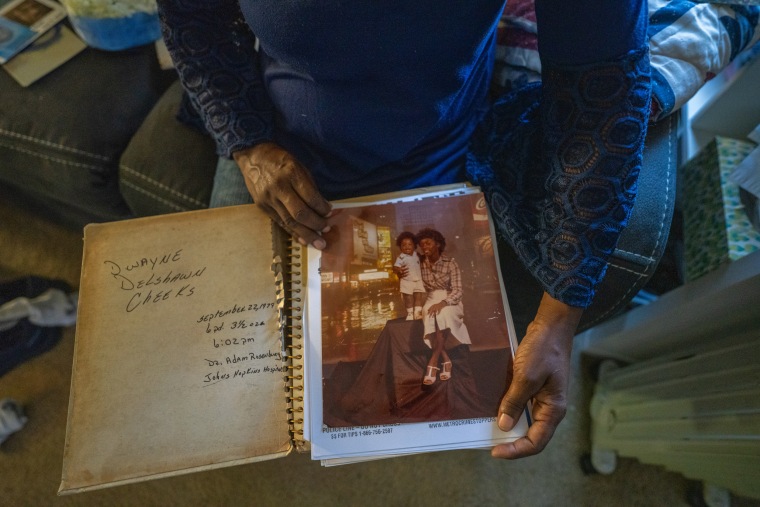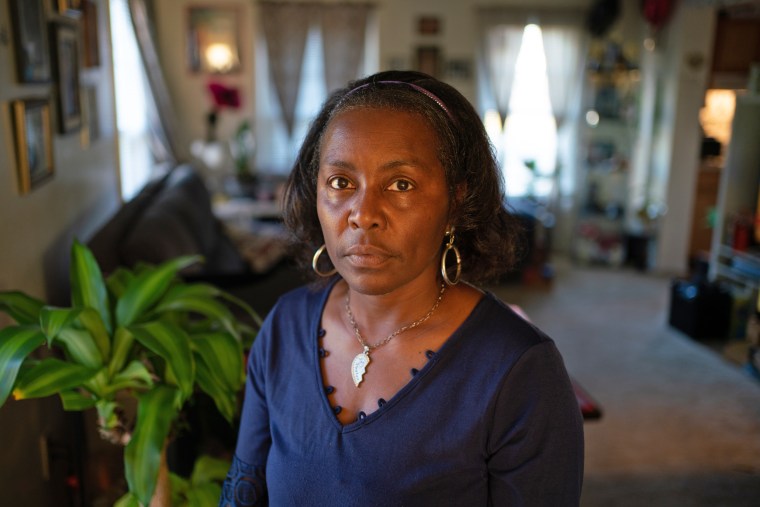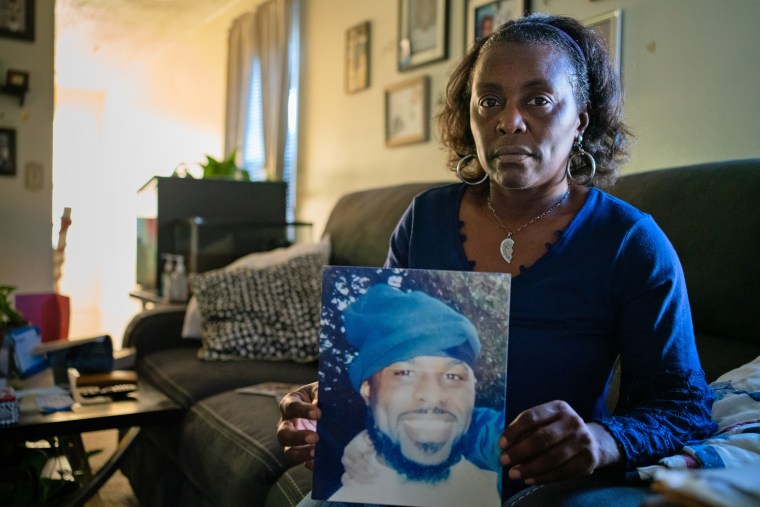On an unusually warm spring evening in the early days of Covid-19, Amber Spencer turned out to celebrate her boyfriend’s birthday at a front stoop cookout in East Baltimore.
Suddenly, bullets flew, hitting her in the chest. When she turned to run, a bullet struck the back of her head and lodged itself in her skull. Then Spencer lost consciousness.
“When I came to, I had been shot in the head. I asked, ‘Where’s my phone?’ and my mom said, ‘The police took it,’” she said.
Now, Spencer is one of four plaintiffs suing the Baltimore Police Department over what they say are illegal seizures of their personal property, including cash, clothing and cellphones. Two of the other plaintiffs include Damon Gray, a man who was shot in June 2019, and Faye Cottman, a woman who was shot in March 2019. The fourth plaintiff, Audrey Carter, is suing on behalf of her son, who was shot and killed in June 2018. Cottman also specifically alleged that her phone was searched without her consent.
To date, none of the plaintiffs or their loved ones have been able to get their property back even though none of the four is accused of a crime. Gray pleaded guilty to a narcotics charge in August, an unrelated incident.
Spencer and Carter are the first among this group to speak publicly about their case.
The federal lawsuit, a proposed class action, argued there may be thousands of other victims of violent crime who have had their property “unlawfully seized, searched, and destroyed” by the Baltimore Police Department.
“There’s a saying in Baltimore: When you get shot, throw your possessions to your friend. Otherwise, you’ll never see them,” said Tianna Mays, one of the plaintiffs’ attorneys.
NBC News reached out to the Baltimore Police Department, the Baltimore solicitor’s office and the Baltimore City Lodge No. 3 Fraternal Order of Police, which all declined comment.
Calvin Harris, director of communications for the Baltimore city mayor’s office, said in an emailed statement that he would not comment on “anything contained in active litigation.” But attorneys for the Baltimore solicitor’s office wrote in a court filing submitted in September that it’s legal for police to “take possession of the clothing of the victim and all available evidence.”
That’s not how the plaintiffs’ attorney sees it. In fact, in a motion Mays filed Nov. 5, she argued that seizing items like phones lack “evidentiary value.” She noted that “these warrantless searches and wholesale seizures are unconstitutional and are the reason for this lawsuit.”
Experts say that if the lawsuit’s claims are borne out, it would bring more scrutiny to the Baltimore Police Department. In 2016, federal investigators concluded the Baltimore Police Department makes “unconstitutional stops, searches, and arrests” among other findings. That Department of Justice report resulted in a formal agreement between Baltimore police and the federal government to reform the city’s practices.
Joe Margulies, a law professor at Cornell University, said presuming the lawsuit’s claims are accurate, the practice of seizing victims’ phones is highly problematic.
“If the allegations are true, the [Baltimore Police Department] is not just seizing but searching phones,” he emailed. “If they seized a defendant’s phone, they’d have to get a warrant before they could search it. Someone will have to explain to me why the victim is entitled to less protection than the accused.”
David Harris, a law professor at the University of Pittsburgh, pointed out that while police procedure allows items to be seized as part of evidence of a crime, “there is no such evidence of that that I can see here,” he emailed.
“And again, even if they can seize it, they can’t search what is inside the device without a warrant, unless there is consent (and there is none here),” he continued, referring to a 2014 Supreme Court case that firmly established the necessity of a warrant to search a cellphone.
Growing losses
After waking up in the hospital, Spencer, 27, who works as a medical assistant, quickly realized the police took her clothes, about $400 in cash and the key to her car, according to the lawsuit.
“Y’all not going to find anything in my phone. I was the one who got shot!” she said, adding that she was never given a receipt or other documentation from the police listing what items they took or why.
After she made multiple attempts to get her items back over the following months, the police department told her it could not hand anything over because of Covid-related protocols, according to the lawsuit.
“My outfit alone was $300,” she said. “I just lost a lot of money that I can never get back. I would like to have my stuff paid for.”
She said she continues to live with the consequences of this random shooting.
“I really don’t go outside; I go to work and I go home, now,” she said. “Anything that drops or pops, I’m like, ‘What was that?!’ I‘m scared to live a normal life. I still have a bullet in my head, so that’s scary too. I’m praying that nothing happens. They said the bullet is lodged in my skull, so it’s not going anywhere. They said removing it would cause more damage than not removing it.”
Sentimental reasons
While Spencer has been waiting for her clothing for over 18 months, Audrey Carter has been waiting nearly twice as long.
In June 2018, Carter’s son, Dwayne Cheeks, was shot to death at a dice game on Germania Avenue, less than a mile from where Spencer would be shot nearly two years later.

At the same time, according to the lawsuit, Baltimore police seized a number of items that were found on Cheeks when he died, including his cellphone, keys, earphones and a lottery ticket.
Almost instantly, Carter began talking to people in the neighborhood where Cheeks was killed, trying to learn more information about who may have taken her son’s life. Meanwhile, she repeatedly asked if the Baltimore Police Department would return any of her son’s possessions, only to be told the department could not do so as it might hinder the investigation, she said in an interview.
“I said ‘OK, fine, if that’s what you need to do,’” she said. “‘I don’t want it back other than for any other reason than it was his.’”
Finally, by December 2019, she was able to arrange a meeting with a Baltimore police officer to get back some of the items. But then Carter learned much of her son’s final possessions had accidentally been destroyed, she said.

Carter said she was devastated. She wanted these items for sentimental reasons and hoped to pass them along to Cheeks’ children. She reached out to the Baltimore Police Department’s evidence control unit head and demanded an explanation.
“They say, ‘We sent you out a letter,’” she said. “I said ‘OK, I never got a letter.’”
Carter said she was told the letter had first been sent to Cheeks himself.
“I said, ‘Do you understand that’s my son? You’re sending a letter to my son at his old address!’” she said. “So he said the letter came back. Of course it came back, because [my son] has passed, he’s not going to accept the letter! I said, ‘It doesn’t make any sense that you would send a letter to the deceased!’”
In January 2019, federal prosecutors first named Correy Cawthorn as a suspect in the killing of Cheeks. Court records show that in February 2019, Cawthorn pleaded not guilty to the charges. Cawthorn and his co-defendants were also named in a superseding indictment returned in May 2021, when federal prosecutors added new defendants. Federal authorities alleged Cawthorn was a high-level member in the “Triple C” gang, which they said was involved in drug trafficking and is responsible for 18 murders.
But even now, Carter said, other than the cash Cheeks had on him when he died, she has been unable to get back anything the Baltimore Police Department still holds that belonged to her son.
“As far as I know, they should still have his watch, his wallet and his phone,” she said.

